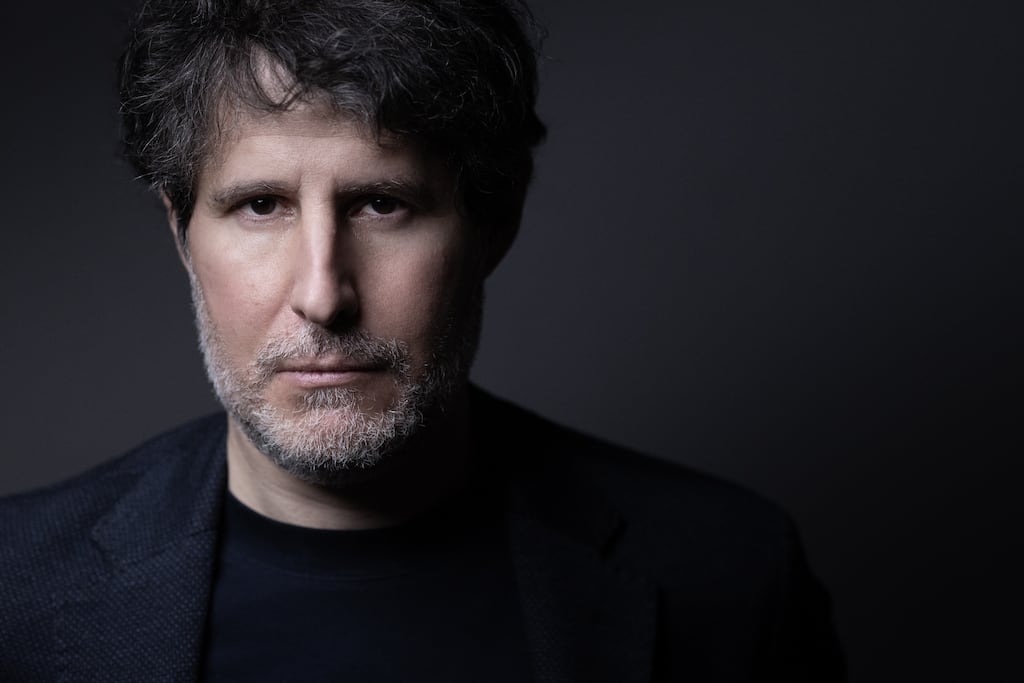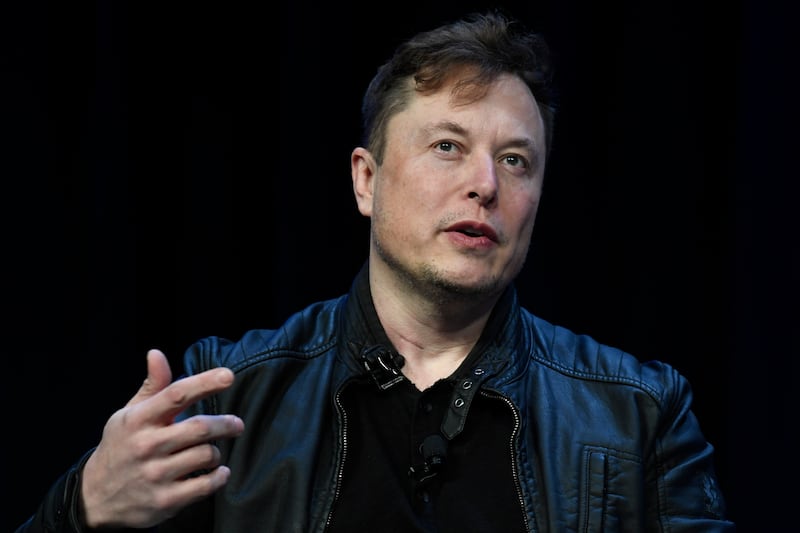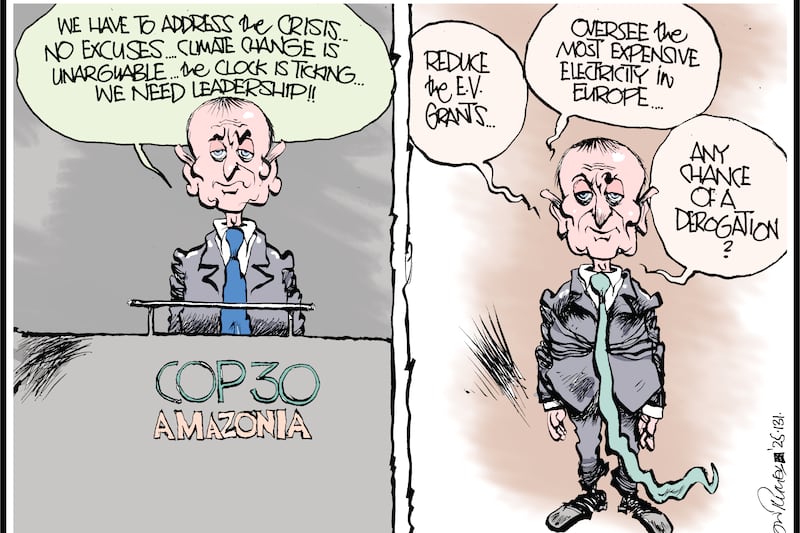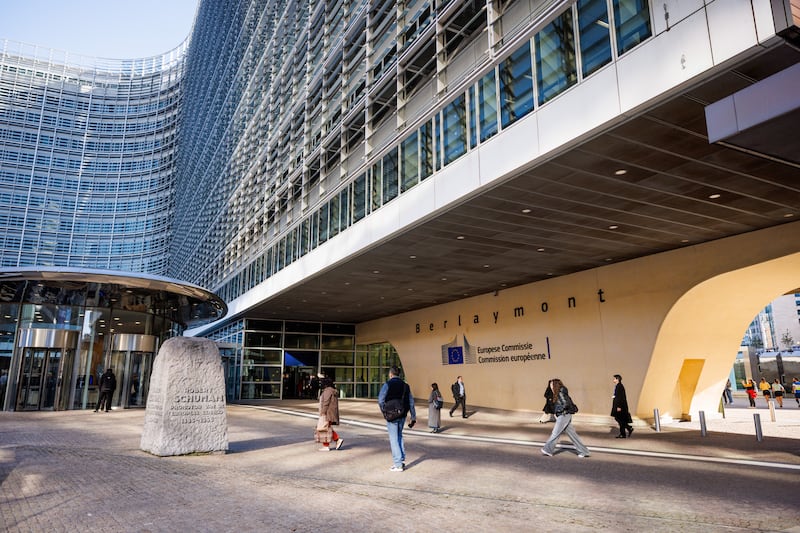Waterstones on Piccadilly is supposedly Europe’s biggest bookshop. I’m traipsing around it looking for Europe’s most fashionable political writer. But where is Giuliano da Empoli, author of The Hour of the Predator? He is meant to be here.
The shop is gargantuan. It has six floors, eight miles of bookshelves, and – today – one increasingly frantic Irish journalist. I just cannot locate Da Empoli, whose works on the angst of our times are quoted by leaders from his friend the French president Emmanuel Macron to Danish prime minister Mette Frederiksen.
I was told I’d find him in the cafe at our allotted hour, but all I see are couples cooing over plates of cake. I struggle to download a picture of him on Google Images to compare directly with the faces of the happy cake-munchers.
But this is the West End of London: mobile phone coverage often doesn’t exist.
READ MORE
I bound up flights of stairs to reach the top-floor restaurant. No sign of him there either. A staff member notices my panic and I explain my quest: “Apart from our main cafe below, we have another one on the lower ground floor. Have you tried there?”
I haven’t tried it yet because I didn’t even know that floor existed – this shop is like a sprawling city-state.
As I hurtle back down the stairs, a single, wonderful bar of mobile coverage pops up on my phone, followed by a download of the author’s face. The panic ends. I find him waiting serenely in a corner of the lower ground floor cafe where I have specifically been told I will meet him; it soon dawns that I haven’t read the email properly.
The 52-year-old looks as you might expect for an in-vogue Italian-Swiss intellectual who writes in French: all literary-academic casual chic with days of stubble.
Meanwhile, I am red-faced and puffed out as I try to feign insouciance. There is no way I can admit that I couldn’t find him. If I can’t even read an email properly, how can I have read his book?

The Hour of the Predator uses beautiful and terrifying imagery to illustrate the symbiotic and dystopian relationships between the populist, authoritarian leaders of our time – Donald Trump and friends – and “post-human” tech dons such as Elon Musk and his ilk, who have mutual vested interests in blitzing rules and fomenting chaos to confuse foes.
Da Empoli blames weak western leaders for not doing enough to rein in these tech “conquistadores” when they had the chance before the strongmen got a foothold. He argues orthodox leaders acquiesced to the tech gods instead, much as the Aztecs did to Conquistadores in the 16th century.
“Faced with the fire and thunder of the internet, social media and artificial intelligence, they have bowed down – in the hope that some of that magical fairy dust might be sprinkled upon them too. I cannot tell you the number of times I have witnessed such rituals of degradation,” writes the former political aide.
[ Enshittification: the word that sums up how we live nowOpens in new window ]
Da Empoli is an acclaimed political author and essayist who was once a close adviser to former Italian prime minister Matteo Renzi. He was born in Paris and raised in Italy. His father, an economic and political thinker, survived a 1980s assassination attempt by Italian communists.
Da Empoli’s last book was the smash-hit 2022 novel The Wizard of the Kremlin, which satirised the court of Russian president Vladimir Putin. It has just been adapted into a film starring Jude Law.
The Hour of the Predator marks his return to nonfiction writing, albeit in a vivid and literary style. Da Empoli sleekly tells us the tale of the enmeshing of the interests of the political strongmen and tech bros – the book’s eponymous “predators” – by describing a dozen different global scenes and myriad characters.
The author uses his direct experience as a political adviser, as well as material gathered while travelling more recently with leaders such as Macron, to give an “in-the-room” style of witness account to these events. The result is as dramatic as any thriller.
Sketches include the political pomposity of a United Nations general assembly, where Da Empoli describes the ludicrous regal posturing of El Salvador’s anti-crime strongman Nayib Bukele, as well as the uber-flex of Saudi Arabian crown prince Mohammed bin Salman imprisoning all of his rivals in a five-star Riyadh hotel.

He also describes the veneration of tech leaders such as OpenAI’s Sam Altman, who have made artificial intelligence a new god. The tech leaders have connived to create a “digital Somalia” where rules that might restrain them are dismantled by the strongmen.
The book is a publishing sensation in France, where the first 200,000 copies flew off the shelves earlier this year, before it was translated into English. Da Empoli tells me his next book will be a return to fiction, a novel exploring themes “in the same universe” of politics as The Hour of the Predator and The Wizard of the Kremlin.
“Reality is a disloyal competitor to fiction,” he says, as we sip spring water – too much coffee already for us. “Fiction must make sense. But reality can be as absurd as it wants. So I thought, I’ll stop writing fiction for a bit and, [with The Hour of the Predator], I’ll treat reality as if it was fiction. I focus on scenes and characters.”
[ The ‘cult’ of Bukele: El Salvador’s millennial strongman heads for second termOpens in new window ]
The result is a frightening diagnosis of the political ills of our time, embodied in the excesses of authoritarians such as Trump, Bukele, Argentina’s Javier Milei, Putin and others. He says these types of leaders are “ancient characters” with their predilections for nationalism, raw power and having their egos massaged.
“It’s a very old form of leadership. It’s about verticality and power and the strength to impose it,” he says. “It is about traditional values and masculinity. It is essentially premodern. The reason it has come back is this new digital ecosystem we live in.”
So the rise of the internet behemoths, with their stranglehold on information, has sent global politics back to the future?
“Yes. It has allowed something very old to come back. For this kind of politics to succeed, the formula is rage plus the algorithm. You need the rage, but if we didn’t have the algorithmic boost, we’d be looking at something quite different.”
Why didn’t the old order of world leaders clamp down on the power of emerging internet behemoths when they had the chance? Why were they so passive?
“I have a fatalistic Italian streak. I think [the old order] just decayed. When you are at the centre of a system, you don’t see what is coming at you from the fringes, and then it wipes you out. The large power of the technological side is what they didn’t see.”
The Bukele miracle on homicide rates is real. Even the Trump ‘miracle’ on immigration is real. It is extraordinarily brutal but effective
— Da Empoli
On the day we meet, details are emerging of Trump’s new peace deal in Gaza. An orthodox leader would probably have been incapable of pushing through such an agreement, I say to Da Empoli.
“The whole point, the whole strength of someone like Trump is that he moves fast and breaks things. It’s maximum velocity. It is so powerful. People feel blocked, like nothing is ever going to happen. And then you have a guy – bang! – who makes decisions. They can be right or wrong. It is a different way of operating.”
Da Empoli argues that, whether it is political leaders such as Trump or tech leaders such as Musk, the chaos and riskiness of their decisions are central and strategic: “Chaos used to be the strategy of the insurgent, but now it is of the seat of power. The decision has to be not only sudden but rash. Taking the sudden initiative is the way to impose your own reality. You impose power where other people feel powerless.”
For this type of leader, he says, there is no point being deliberative.
“If you take a long time thinking, analysing: that’s not an act of power. It’s something that any bureaucrat can do. And it’s what lots of people don’t want any more.”
Strongman leaders promise “miracles”, he says, where traditional leaders can offer only rule books and law. It’s why Trump has made such brutal headway on tackling illegal immigration and Bukele has managed to reduce El Salvador’s once-stratospheric murder rate: they have thrown the rule books out the window.
“When the miracle doesn’t manifest itself, that’s when it gets tricky. We’ll see what happens in the Middle East with Trump’s Gaza plan. The Bukele miracle on homicide rates is real. Even the Trump ‘miracle’ on immigration is real. It is extraordinarily brutal but effective.”
He says almost every Democrat who has run for US president or vice-president since the early 1980s has been a lawyer.
“They can resort to the law when facing someone like Trump. But he wants to break the laws and do miracles. You can say to him, No – you’re a crook and you’re breaking the law. And it’s true – law is important in a democracy. But it is politically a weak answer. They focus on laws and rules while he is trying to fix problems by performing miracles.”
Does the strongman style of leadership worry him?
“It’s dangerous to have a governance system that is so broken and so nuts in a world where humans have the potential to self-destroy. To me this feels a bit scary.”
The Hour of the Predator is light on solutions, but heavy on fascinating details. Da Empoli says he saw weakness in the old order when he attended with Renzi an Obama Foundation event in Chicago in 2017.
Attendees couldn’t simply converse over dinner. Each table had its interactions structured by an intellectual chaperone or “conversation facilitator”.
At another table, an Italian military man was scolded by his “facilitator” when, in answer to a question about who he would most like to be, he replied “myself”.
Da Empoli argues that “wokeism was a godsend” for the predators. He realises that many of the people he met in that room in Chicago were “singularly ill equipped to fight the coming battle”.

He also unearths fascinating details about the Bin Salman-ordered infamous hotel kidnapping of Saudi sheikhs. Da Empoli says they were all stripped of their clothing on arrival and forced to convene in a room wearing simple white pants and tops – it was like day zero for plutocrats, reborn as babies.
He also recalls being on a closed-door panel in Lisbon in 2023 with Altman, the founder of OpenAI, and Demis Hassabis of DeepMind. The techies tried to argue that AI would solve all of humanity’s ills, even though they didn’t understand themselves what would happen – we just had to trust the technology. Da Empoli suggests they were “replacing knowledge with faith” in AI, to “go back in time to a world of incomprehensible magic”.
The Hour of the Predator is full of dark foreboding. Yet I realise towards the end of our conversation that da Empoli is a man who also appears to value levity. He giggles his way through much of our discussion, perhaps incredulous at the madness of it all.
Despite everything, is he hopeful for the future?
“I’m excited for it. It’s part of human nature, or at least part of my nature. I also have a daughter. She is 15. I’m excited for her. Being a father is also about passing on some excitement for what is to come,” he says.
“Rationally, you can say I am a bit pessimistic – this book is not so cheerful. But my character is also optimistic. What happens next is never what is inevitable. It’s always what is unpredictable. I like the unpredictable.”
The Hour of the Predator: Encounters with the Autocrats and Tech Billionaires Taking Over the World is published by Pushkin

















